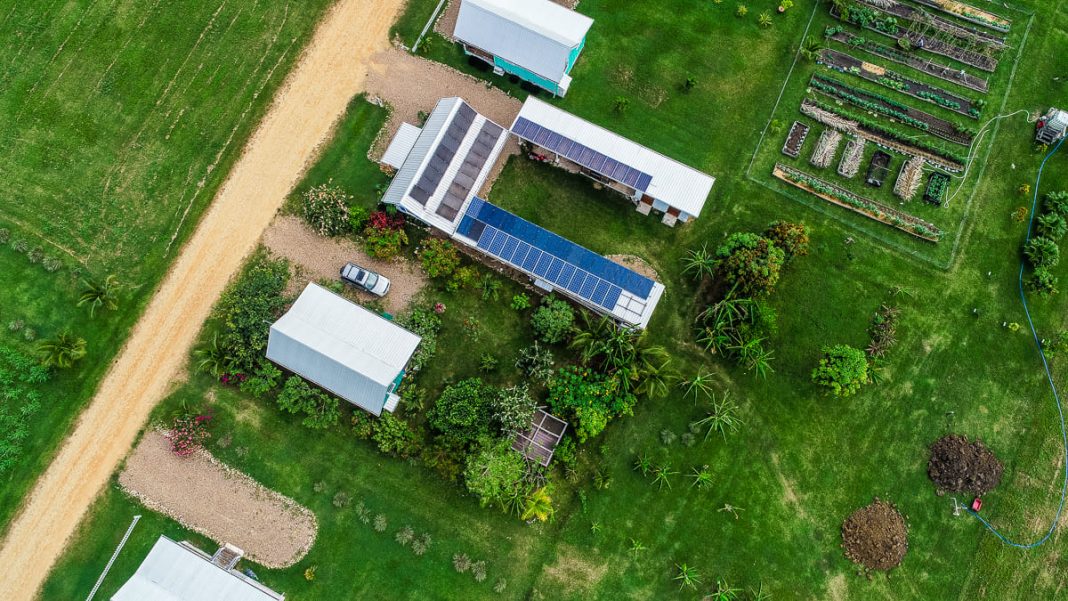Introduction to Off-Grid Living
Off-grid living is the disconnection from the traditional power grid and embracing a self-sufficient lifestyle. It covers renewable energy, growing one’s food, and garnering natural resources such as rainwater. It has become so trendy nowadays because of the rising need to reduce carbon footprints, utility bills, and independence. It’s going back to a simpler life, but still with all the modern conveniences, so one can live in harmony with nature. Carmelita Gardens in the Cayo District is among such communities that embrace this lifestyle and prove off-grid living can also be quite sustainable and enjoyable.
Benefits of Solar Panels
Solar panels boast many advantages. In the first place, they reduce electricity expenses by providing free power after the initial installation. They are a renewable source of energy, too, hence they would never run out as opposed to fossil fuel. Also, they have very minimal maintenance and have a shelf life of 25-30 years, thus making long-term investments for off-grid living.
Rainwater Catchment
Rainwater catchment is one of the most important features associated with off-grid living. In this system, water from rainfall is collected and stored for further uses. Commonly, a rainwater catchment comprises a roof that catches the water, gutters to conduct it, and storage tanks to hold the water. Since you will be catching rainwater, you are relieving your dependency on supplies from city water, and this can be pretty helpful if you live in areas that have droughts or any other type of shortage of water. You can further have a filtration system for your rainwater to ensure it is potable.
Rainwater Catchment and Self-Sustainability
Rainwater catchment is important for having a steady water supply, even in very remote areas. It is an eco-friendly method of conserving resources while providing water not only for irrigation but also household purposes and drinking. For instances like Carmelita Gardens, rainwater catchment systems are one of the prime features in relying less on municipal water and enjoying life in a sustainable manner.
Gardens and Orchards: Grow Your Own Food
Many consider growing one’s own food to be one of the most rewarding factors for off-grid living. Gardens and orchards at home help one get a steady supply of fruits, vegetables, and herbs. By cultivating your own produce, you ensure it is organic, become less reliant on grocery stores, and generally see an improvement in food security.
How Gardens Can Transform Off-Grid Living
With gardens, there is an additional value added in the form of mental and physical health due to their fresh produce. Maintaining a garden can be considered therapeutic and a peaceful respite from daily stresses. Furthermore, such homegrown foods minimize grocery bills while promoting a healthier diet and reducing the carbon footprint that comes with food transportation.
Carmelita Gardens: A Case Study in Off-Grid Living
Carmelita Gardens, Belize, displays the epitome of high-quality, sustainable off-grid living. Solar energy, rainwater catchment, and organic gardening are incorporated into daily life. The result is a thriving, self-sufficient community that executes modern comfort with a minimal environmental footprint.
For Property Tour Off-Grid Riverfront Home at Carmelita Gardens, Cayo Belize – $252,000
The Financial Aspect of Off-Grid Living
While the upfront costs of installing solar panels, catchment water systems, and gardens can be quite high, the long-term savings are considerable. By wiping out utility bills and reducing grocery expense, along with keeping ongoing maintenance costs very low, the off-grid lifestyle is rather affordable. Many communities, like Carmelita Gardens, are able to access a very affordable solution by taking advantage of shared resources and knowledge.
Off-grid living greatly reduces your carbon footprint. You avoid the combustion of fossil fuels involved in the value chain of producing and distributing solar-generated electricity. Likewise, rainwater collection saves water, while gardening enhances biodiversity. In a nutshell, off-grid living is about moving toward a sustainable planet.
Challenges of Going Off-Grid
Off-grid living has its challenges, be the high initial costs, or learning the systems that keep you going. If designed well and supported by the community, these challenges can be lessened. In Carmelita Gardens, access to shared resources and knowledge eases that transition for newcomers.
Community and Off-Grid Living
There are some really great support systems within off-grid communities. Sharing resources, skills, and experiences with others makes this lifestyle more tolerable and enjoyable. Carmelita Gardens fosters a sense of community by having neighbors help neighbors thrive in their self-sufficient lifestyles.
The Future of Off-Grid Living
Off-grid living becomes far more feasible and appealing in the wake of pioneering renewable technologies. With improvements in solar panels, battery storage, and water collection, off-grid living has turned into a perceptively realistic way of life for an increasing number of people. It’s a solution that can be a part of solving global energy and environmental problems.
Conclusion: The Beauty of Self-Sufficient Life
Off-grid living is that feeling of free, sustainable livelihood, consuming less utilities provided by the companies, and being much closer to nature. From solar panels to rainwater harvesting to cultivating your own garden-the amazing benefits just continue. Carmelita Gardens are a proof that off-grid living can be full and green, and people choose this for their goal to live self-sufficiently.
Frequently Asked Questions
What is off-grid living?
Off-grid living means generating your own electricity, collecting water, and growing food without relying on public utilities.
How do solar panels work in off-grid systems?
Solar panels collect sunlight, convert it into electricity, and store it in batteries for later use.
What are the advantages of rainwater catchment?
It will be a sustainable source of water, minimizing dependence on city water and therefore economizing on natural resources.
Is it expensive to start living off-grid?
While the initial costs might be high, the long-term savings in terms of energy, water, and food production make off-grid living cost-effective over a period of time.
Can I grow all my own food in an off-grid setup?
Yes, most of the off-grid setups have gardens and orchards, which provide a big percentage of daily intakes.


